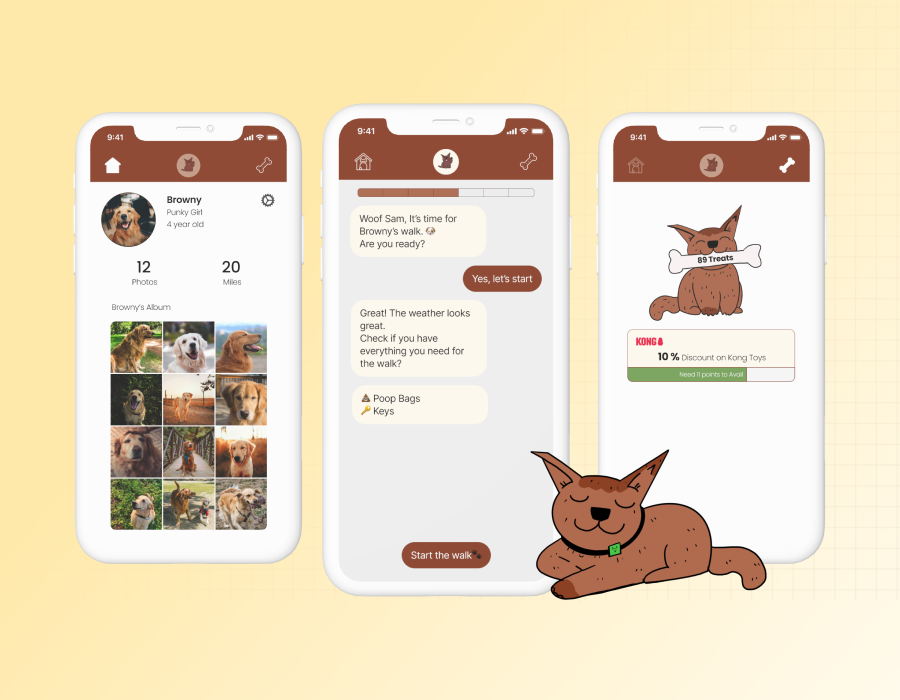

COCOBOT
Smart Dog Products
Based on the Build, Measure, & Learn Model, Hooked Model by Nir Eyal, & The Right It by Alberto Savoia, create a habit-forming product that motivates pet parents to walk their dogs daily and create the core experience.
Roles & Responsibilities
User Research
UX Design
Usability Testing
Tools Used
Figma
Miro
Illustrator
Project Context
Spring 2022
To create a GUI Product
Scale the product into non-GUI
What’s the Problem?
After two years of WOH and the pandemic, pet owners have adjusted to the new normal their dog got sufficient time for their walks. With Pandemic rules relaxing and everyone returning to work, adjusting to pre-covid normal has taken a toll on pets and pet owners. My roommate and friends struggle with this; they try their best to walk their dogs daily and manage their commute, work, and self-care. But sometimes, they find it challenging to take their dog out for a good walk and hire dog walkers.
So how can busy pet owners build a daily habit of walking their dogs?
Problem Background
30% - 70%
of people walk their dogs regularly
40%
of people do not walk their dogs regularly
20 - 30 minutes
of vigorous exercise needed per day.
The Solution
CocoBot is your dog's best friend and your accountability partner. The AI Chatbot is designed to motivate you to create a daily habit of walking your dog, and on each completed walk, you'll receive treats that can be redeemed in your next pet product shopping.
You're not failing as a pet owner if you miss a walk — Cocobot just ensures your dog is getting the exercise needed regularly.
CocoBot Uniqueness
Personalized Accountability Partner
Digital Pet
Rewards
Habit-Forming
Hooked Model
Using the Hooked Model by Nir Eyal, I built the user’s interactions with a product as they pass through four phases i.e. Trigger, Action, Reward, and Investment.
Research
Looking into the most popular dog-walking and pet-service applications for our Competitive Analysis, I found that most products catered to scheduling dog-walkers to take dogs for a walk. ' Found a few gamified applications for dog-parents and dogs, mainly surrounding vigorous activities and charity walks/runs.
Bibliography studies emphasized why it’s important for the dog parents and dogs to walk together.
A casual user interviews with 3 dog parents validated a need for a habit-forming application that will hold them accountable to walk their dogs daily.
Storyboard
Based on Research Insight and the Hooked Model, we created a storyboard with a user story - a person who loves her dog but finds it hard to manage her time.
MOSCOW Method - Scoping
The storyboarding and the hooked model helped prioritize the scope, the key features, and experiences using the MOSCOW method.
Each feature and core experience was categorized into different experiences - basic, performance, & delight.
User Flow - Structure
Using the MOSCOW and after many ideation, I designed the user flow to present the right informations and the components.
Conversation Design Framework
I used a conversational design framework to expand on how Cocobot would interact and encourage dog parents to walk their dogs. It took a few iterations, but this gave me a good understanding of how a chatbot or voice bot interacts with users.
Discovery of the product:
Sam downloads Cocobot to help create the daily habits of walking her dog.
Use of the product:
Sam going out for a walk with her dog and cocbot
Feedback from the product:
Sam gets feedback from cocobot about their walks keeping her motivated.
StyleGuide - Coco’s Style
Lo-Fi Wireframe
Overview of the main user flow in Cocobot app using Hook Model.
Digital Prototype
Non-GUI Design
In the second half of the semester, we focused on scaling our GUI product into a Non-GUI Product. We explored different non-GUI categories and determined the best one that works for our product. Using Pretotyping by Alberto Savoia (from his book The Right it), I tested my non-GUI product idea using the Risky Assumption Matrix and created a Pretotype Plan.
Validating Desirability Risks
At least,
25%
of the Dog, Owners will buy Coco Smart Collar to walk their dogs.
At least,
15%
of Dog Owners will be motivated to buy Coco Smart Collar because of the treats feature.
Validating if people sign up for the product using the combination of youtube, social media, and a fake front door.
Outcome of Pretotyping
25%
of the market wanted to purchase Coco Smart Collar to walk their dogs.
20%
of Dog owners were motivated to buy Coco Smart Collar cause of Treats that to them a discount on pet supplies.




















